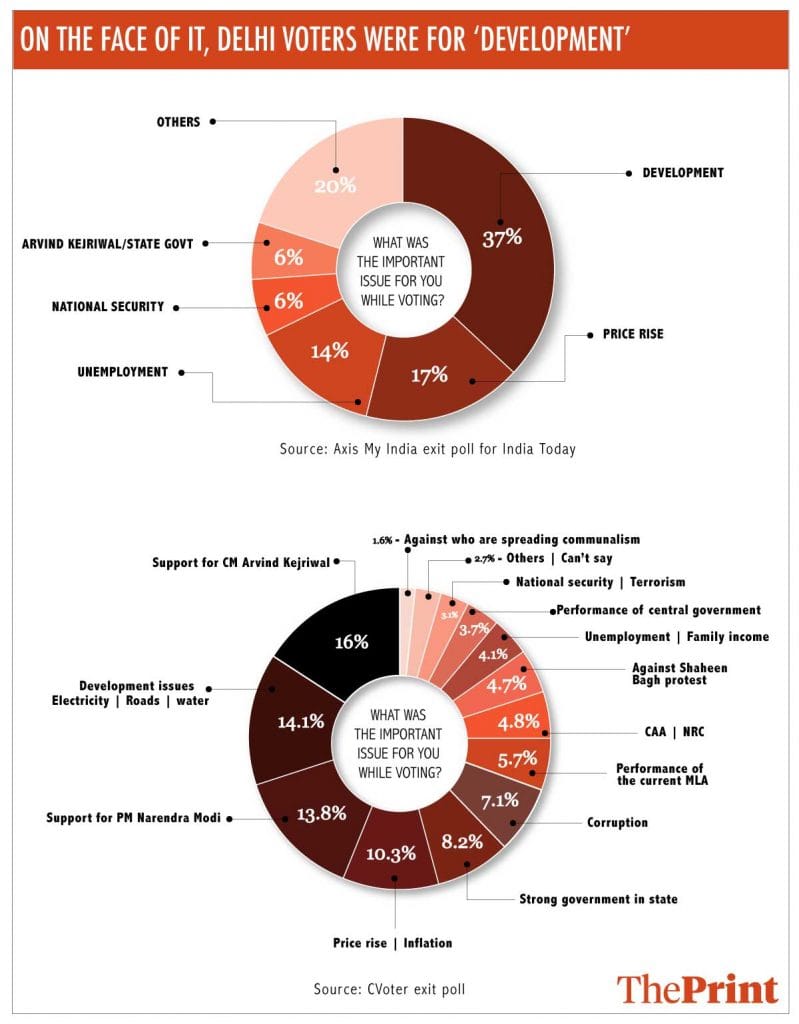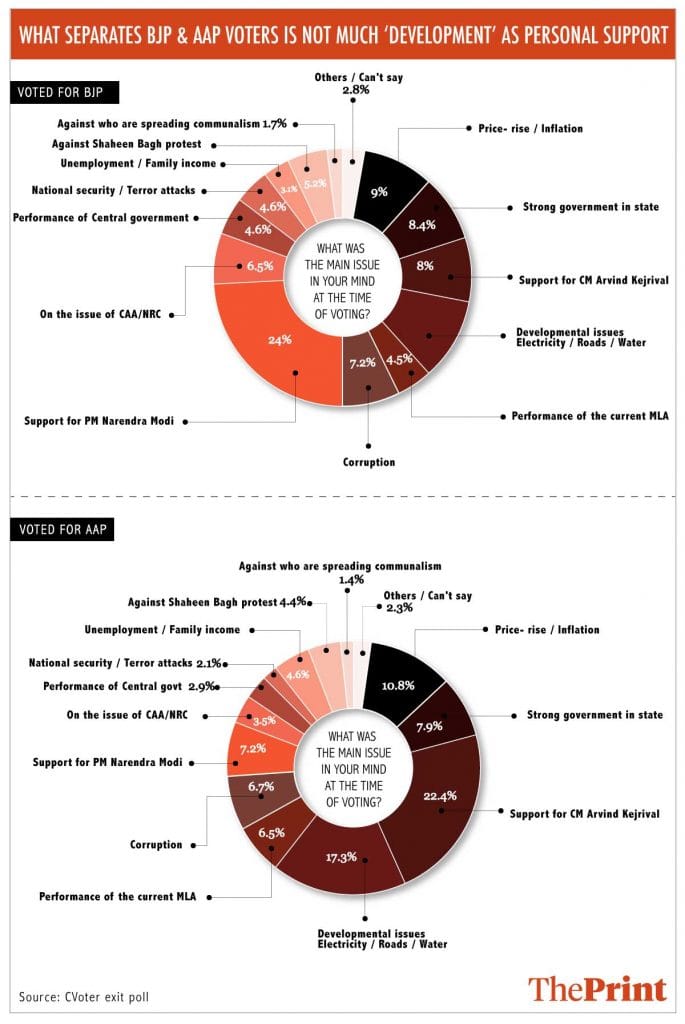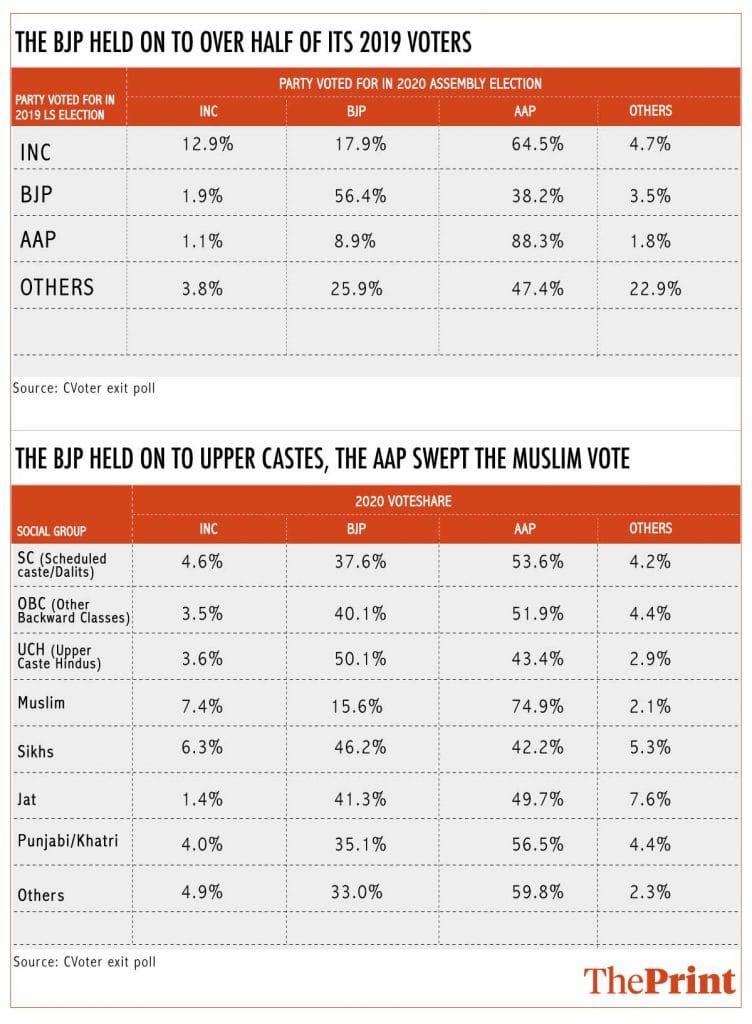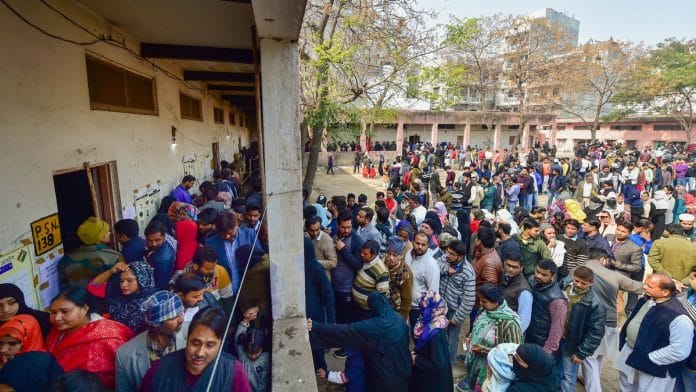Most election analyses seek big narratives. But in no recent elections in India was the consensus on the narrative as clear as in the Delhi assembly election. Depending on which side you spoke to, it was “development versus communalism”, or “freebies versus nationalism”. But no other recent election also demonstrates with as much clarity the futility of a single diagnosis of what Indians are truly voting for.
On the face of it, it would appear that yes, Delhi voters truly voted for “development”. The exit polls suggested that for Delhi, the real issue was development and not the Citizenship Amendment Act or the similar “Hindu-Muslim issues”. Certainly, that is what voters would appear to have told surveyors. In the India Today-Axis My India exit poll, over a third of voters said that “development” was the top issue, while fewer than 10 per cent named “national security”. In the ABP-CVoter exit poll, three times as many voters said that they were voting for “development” as those who said the top issue on their mind was the CAA.

However, there are problems in seeing this as an easy binary. For one, voters always say that the top issue on their mind is development, but their loyalty to parties with strong ideological commitments — to say, secularism versus Hindutva — is unwavering. These revealed preferences demonstrate the futility of assuming that what voters claim as the top issue on their minds, was the only issue that governed their decision matrix.
Also read: Data shows upper-caste voters of both BJP and Congress support core Hindutva issues
Claiming that the 2020 Delhi assembly election was won on “development” alone is as disingenuous as claiming that the 2019 Lok Sabha election was won on “development” alone, even though voters said so in both these elections.
In the recently-concluded Delhi election, there were only a few differences between what Aam Aadmi Party voters and Bharatiya Janata Party voters claimed were the main issues they were voting for. The difference was actually in the leader they supported.
The biggest motivating factor for AAP voters was Chief Minister Arvind Kejriwal, and the biggest driver for BJP voters was support for Prime Minister Narendra Modi. Analysts are not wrong when they say that the support in Delhi for the BJP was weak but for PM Modi was strong. But this same logic could potentially be applied to the AAP too. The cult of personality in Indian politics is real, and is as much a part of the national capital’s politics as it is of the southern states.

That’s one part of the decision matrix. Here’s another — was this a for-or-against communal election? And if voters are ideological and not voting purely for development alone, then how did the AAP manage to win both Hindu and Muslim votes in an election where fanning communal tensions came not just from hateful campaigning by the BJP leaders, but also from the very real threat of the disenfranchisement of Muslims that loomed in the background? The answer seems to come from the different motivations of Hindu and Muslim voters in 2020.
Also read: Why Delhi voters chose Arvind Kejriwal for CM and Narendra Modi for PM
It’s safe to say that the Delhi Hindu vote largely went to the BJP in the 2019 Lok Sabha election. Despite the common refrain that “Delhi voters now vote for the AAP in state elections and the BJP in the centre”, the BJP actually held on to over half of its base. It got over half of the upper-caste Hindu vote in 2020, and its vote share in 2020 was higher than it was in 2015. Yes, the AAP did get some of the BJP’s 2019 voters. But it also seems to have got just as many of the Congress’ 2019 voters.

The AAP got the lion’s share of the Muslim vote, significant in a city-state with 13 per cent Muslims. So, does this imply Muslim approval of Kejriwal’s positions? Unlikely. “When asked about the reason for voting in favour of the AAP, the Muslim voters said it was on account of its winnability against the BJP. In other words, the Muslim voters of Delhi voted for the AAP because they felt it was better poised to defeat the BJP in comparison to the Congress”, India Today reported Axis My India pollsters as saying.
Also read: 5 reasons why Modi-Shah’s BJP lost to Arvind Kejriwal’s AAP in Delhi election
For who then were people in Delhi truly voting for? The best we can say weighing the evidence is that voters in India are increasingly ideologically committed, more likely to make up their minds even before the campaign begins, and more enthused by individual political leaders than ever before. There is no doubt that they do want material improvements in their life, but the ideological signalling — whether overt or implied — by leaders and parties they vote for and the ones they hope to defeat matters and is something they factor in.
The author is a Chennai-based data journalist. Views are personal.







Very good analysis. Thanks
?
This analysis is perhaps comes closest to reality.